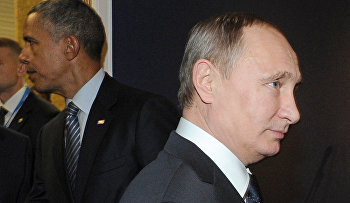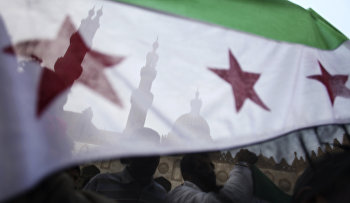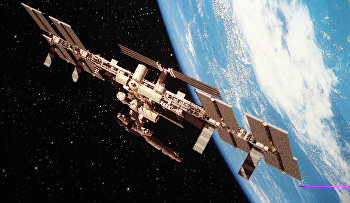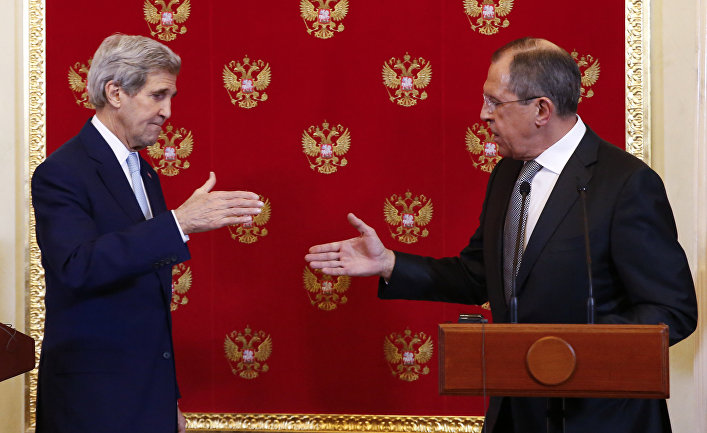Negative outcomes
In 2015 relations between Russia and America slumped into a period of open confrontation. Bilateral relations continue to head in conflicting directions. A deep-seated crisis of mistrust not only occludes the chance of collaboration in areas which offer real opportunities (such as, for example, the struggle against Islamic terrorism in Syria), but could prompt dire yet unintended clashes – including those between the USA and Russia.
Informed and academic opinion on both sides of the Atlantic are increasingly discussing the ramifications of a new Cold War – flailing with outdated terminology to explain the background to a wholly different crisis. This development is significant in itself. The sanctions war is galloping onwards. The mass media portrays it as a 'clash of images' between the two nations, while anti-American feelings in Russia – and similarly Russophobia in America – in 2015 reached the most rampant levels since the collapse of international relations in the bipolar world.
Comfort instead of greatness
Post-Soviet Russia's crisis in relations with the United States stems directly from its actions in Crimea and in South-Eastern Ukraine, but is part and parcel of the larger crisis in regional and world governance that followed the end of the Cold War. The outgoing year saw the complete erosion of the post-bipolar world order – through its actions in Syria and Ukraine, Russia has demonstrated its unwillingness to accommodate the asymmetry of Russo-American relations, or with the USA's global dominance. Vladimir Putin made a further defiant rejection of these at the Valdai Club meeting on 22 October 2015.

Russia has decided to teach the West a lesson – to teach it to respect Russian national interests, and show Americans the kind of wreckage their short-sighted double standards has wreaked. This revival in national pride claims broad-centered support across Russian society – an unspoken contract between government and the governed – comfort instead of greatness. However, it remains an open question how long such consensus can last, and whether Russia's military operations in Syria will buoy it up – to compensate for E Ukraine, the galloping economic crisis, and the falling standards of living across the country.
The USA, for its part, isn't going to revise its previous policy of 're-set' in Russian relations – refusing to see any basis for Russia's ambitions from a nation with a lower GDP than Spain (as President Obama claimed). The USA still bases its foreign policy towards Russia on the basis of values. This means that the formation of the 'agenda' in bilateral relations will depend on the internal political processes in Russia itself. Although there may be more realistic voices in the USA who call for a more pragmatic policy towards Russia, these have been drowned out by the baying mob calling for Russia to be punished with international isolation and economic sanctions – over both the Ukraine issue, and authoritarian internal policies.
Despite progress in US-Russia relations this year, 2016 will not be easy, says @AlexGabuev https://t.co/szT1SxywCN pic.twitter.com/gg2gS5akjj
— Carnegie Russia (@CarnegieRussia) December 22, 2015
Consequently the formulation of new policies in Russo-American relations, as Dmitry Trenin has noted, has become an unbalanced confrontation, doubly like to cause danger against a background of the collapse of common courtesies.
The info wars between Russia and the USA that run as a parallel dimension of the present crisis have given the clearest view of the way Russia is using anti-Americanism to generate a hostile image of the United States — in order to hold Russian society together.
Anti-Americanism and Russophobia
2015 saw a new Russian witchhunt for 'foreign agents' – a hunt which focused on American organizations in Russia such as the MacArthur Foundation, and the American Cultural Centre of the American Embassy. Claims about the 'machinations of Washington' were used to ward off the slightest accusations against Russia in a raft of different events – from the activities in Ukraine to world oil prices, and from the FIFA bribing allegations to the Russian athletics doping scandals.
The enemy is clear, hating them is simple, and national self-esteem only rises from doing so. Especially since not all is peaches-and-cream for this enemy either – with race riots (to take only Ferguson and Baltimore), and fiascos in foreign policy (we need mention only Iraq, Afghanistan, the 'Arab Spring', and Syria). Anti-American rhetoric in Russia is intrinsically linked to the anti-liberal agenda in Russian society overall, as a mirror of the way that America's wonderful universal liberalism is pitted against backward Russian nationalist entrenchment. It's a fundamental dichotomy of value systems, and found its reflection in the speeches made by Vladimir Putin and Barack Obama at the September sitting of the United Nations General Assembly. These speeches highlighted the gulf in opinions about world politics, and about the Ukraine and Syria in particular.

America's traditional hatred of Russia has never evaporated, and playing the “Russian card” is a favorite gambit in American domestic politics. This is especially so among Republicans, particular in 2015's race to gain the Republican presidential nomination. Russia's latest bogeyman role in the USA is that of a nation pursuing nationalist interests as a revisionist state, gleefully casting aside the norms of international law.
During such a crisis, both Russia and the United States pay heightened attention to the prevailing political situation on the opposite side of the Atlantic. The difference is that Russia has lost the crucial role in the formation of the American psyche which it held during the Cold War – while America still has the idea of being 'the alternative' for Russians. And this asymmetrical relationship redoubles the asymmetric confrontation, thus deepening the crisis still further.
Positive outcomes
Even so, there were still positive outcomes to be had in 2015. Despite their standoff, Russia and the USA were able to work together to achieve the close-down of the Iranian nuclear program. In other areas, RosCosmos and NATO agreed on building a new orbital space-station in 2024.

Alongside side, thanks to the Russian military operation in Syria and the beginnings of a mutual Russian-American position on the struggle against Daesh (ISIL), Russia ended 2015 less isolated than it had been in 2014. Putin and Obama have been in touch with each other several times over recent months, while John Kerry and Sergey Lavrov have met regularly (despite the alleged sensation of Kerry's May visit to Sochi). Kerry's most recent visit to Moscow, in December, took place against the background of a more cordial atmosphere. The US Secretary said the USA is not trying to isolate Russia. He also took a stroll along Moscow's touristy Arbat Street, rekindling the mood of the perestroika era, and took time to discuss the UN Resolution on Syria with Putin that Russia had pushed through the Security Council over three tough days of talking – even though the previous Resolution had been stymied.
Don't take @HillaryClinton's claim of a possible #USRussia 'reset' seriously https://t.co/ckDmO7rANl #Election2016 pic.twitter.com/MB2y2JLCTL
— Sputnik (@SputnikInt) January 18, 2016
Thus in many ways 2015 demonstrated a split between public policy and diplomatic dealings. There was a similar divide between the ways domestic policies are implemented in the USA and in Russia. In the case of Russia, these processes are heavily identified with the personalities of the politicians promoting them, whereas in the USA they have to pass a complex administrative structure which is swayed by many factors – including wars between parties, conflicting positions of different governmental organizations, public opinion, and other issues.
Should we be waiting for the re-set?
Of course, no kind of strategic partnership is under discussion with the USA. The US has no intention of including Russia in its Syrian coalition. Any lifting of sanctions will depend strictly on Russia's adherence to the terms of the Minsk-2 Treaty. Further empty delusions of a re-set stem from the idea of a Russian rapprochement with whichever new administration comes into power in Washington after the presidential elections. Nothing of the sort will happen. Even so, perhaps some normalization of the high-level dialogue process – so that even the process of dialogue isn't viewed as humiliation or victory – and some collaboration on non-contentious issues might be possible. The stabilization of relationships even at their present level would be cause for celebration. It all indicates the depth of the trough in which Russian and American relations lay at the close of 2015.






